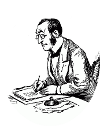Interview with 2013 SABR-Origins Chair Bill Johnson
Property "Version" (as page type) with input value "{{{Version}}}" contains invalid characters or is incomplete and therefore can cause unexpected results during a query or annotation process.
Comments
<comments voting="Plus" />
Interview with Bill Johnson, New Chair of SABR’s Origins Committee
(from the August 2013 NDPost)
Protoball: How did you get interested in baseball’s origins era? Bill Johnson: My earlier research began with a simple inquiry into Hal Trosky’s life story for the SABR Biography Committee as I had married into the family and gained access to a great deal of source material. Once into the sources, my interests expanded to include Iowa baseball players, but in order to better understand and then tell their stories, I had to dig into the origins and proliferation of the game in the Midwest. The tipping point, though, was at the 2009 SABR convention in Cleveland, where we saw the premier of Sam Marchiano’s Base Ball Discovered. Since then I’ve become absolutely mesmerized with the “origins” field. Protoball: Do you see aspects of your prior work and training that led you to take on a SABR research committee, or is this mainly a chance to change gears and start something new? Bill Johnson: My academic background is in rhetoric, with a graduate degree in history, and my professional identity grew over a 30 year career in the US Navy. Exposure to disciplined historical inquiry, written and oral argumentation, and a general comfort with the opportunities that the structure and legitimacy that a committee can offer all bleed across a range of disciplines; this opportunity to actively engage in exciting work with an array of talented and dedicated researchers is almost too good to be true. Protoball: As a relative newcomer, what are your impressions of the field, and its progress, at this point? Bill Johnson: There are some gold-standard historians/diggers and meta narratives that do a superb job of outlining the “known”. The fact that individuals like John Thorn, David Block and so many others are actively engaged in the field, pursuing both SABR research as well as independent lines of inquiry, puts a credible, public face on the aggregate work. The thing that I’ve been amazed by, and encouraged by, to this point is the amount of outstanding work occurring at the local level. From town to town and state to state, diggers are diligently uncovering pieces of the story of baseball’s origin and spread, and eventually we should be able to piece the entire story together into a sort of coherent, unified view.
Protoball: Are there particular new Origins Committee program initiatives that you think might fit the times and SABR’s current capabilities?
Bill Johnson: Of all the ‘things’ going on in the field, the single most exciting to me is the Protoball.org website. Distributed research, in any field, benefits demonstrably from community-wide access to a research nexus, a place where the work can be shared and questioned…in the field of serious academic history, that is vital to creating defensible histories and credibility for the historians.
Protoball, then, allows us to reach across borders and penetrate stovepipes. Origins work can support, and be supported by, say, the UK Chapter or the 19th Century Committee or the BioProject and Bibliography committees and, as we expand the vision globally, by groups that transcend the U.S. There is tremendous opportunity in the field, and almost any path the Origins membership chooses to follow will add to our collective knowledge.
I feel very fortunate to have been given this opportunity by SABR. I really do hope to help the Origins Committee by working to minimize any cross-organization barriers as we create a more complete picture of baseball's proliferation. Mostly, though, I hope to stay out of the way -- to paraphrase an old saw, "every group has 'that person', the one who is too loud, stands too close at parties, and speaks when they should be listening; if you can't figure out who 'that person' is in your group, then it’s probably you." In this arena, the origins of baseball, I have yet to find 'that person'. That troubles me.
Protoball: What had surprised you most as you’ve begun to familiarize yourself with the origins field and its small fleet of researchers? Are there particular recent advances that struck you as interesting and important?
Bill Johnson: Within the extraordinary body of work that has been created by a relative few, the attempts to begin mapping the spread of the game as a function of the spread of society (transportation modes like rail and waterway, communications via news/media sources, and so on) is compelling. Some are already working on this approach, and the results will be compelling. This will also provide access of the committee to other venues like the terrific annual SUNY Oneonta/NBBHoF annual Cooperstown Symposium on Baseball and American Culture. The origins of the game are a small but relevant slice of American and world history, and need to be discovered, analyzed and understood.
Protoball: Do you find that a lot of your baseball friends are a little attached to the Doubleday Legend on where base ball came from? Bill Johnson: I am afraid that I am guilty, certainly more so now, of self-selecting baseball friends who are conversant with the Mills Commission, William Bray’s diary, and the like. Most true baseball fans, in my view, don’t want to buy into something that’s been debunked, and are happy to learn more about what we have learned about the actual origins of the game. That, alone, makes this committee and its membership invaluable. The memory of the game is not changing, merely being revealed. Note: Bill’s email address: bill.johnson162@gmail.com.
